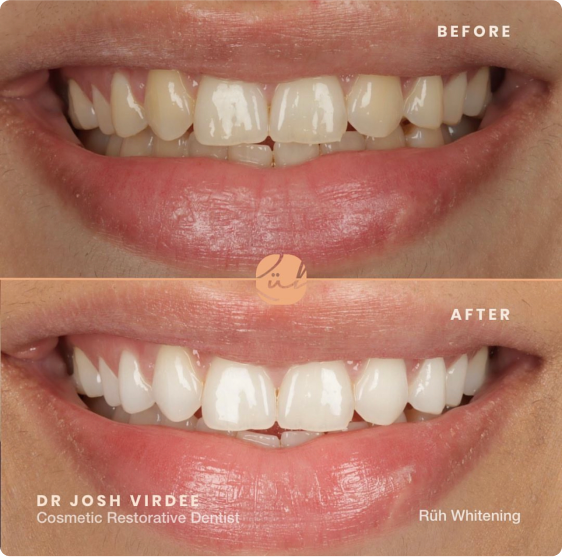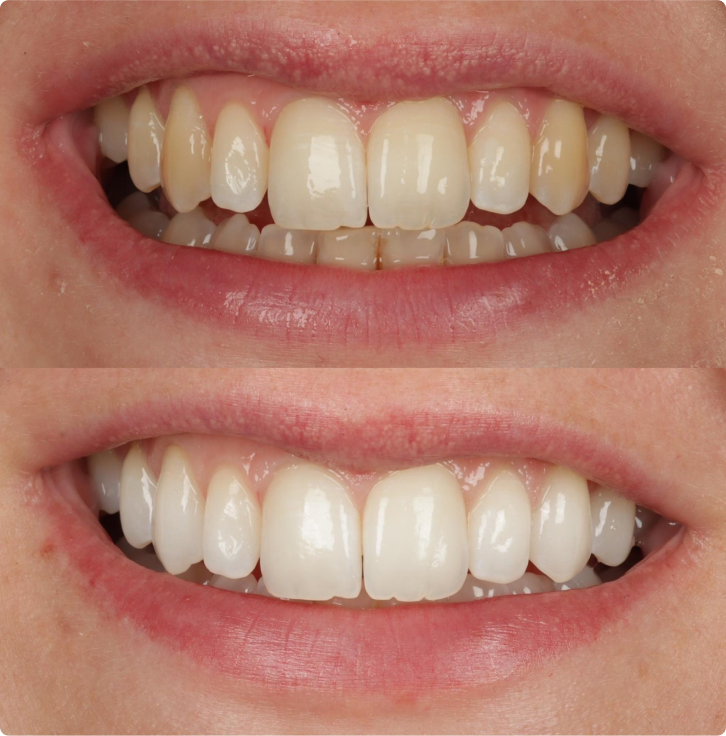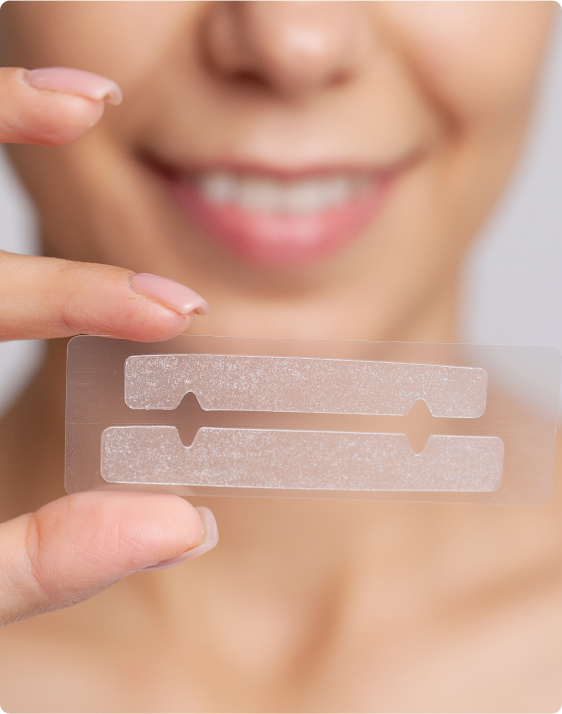Teeth whitening is a cosmetic dental treatment designed to make your smile brighter by removing stains and discoloration from the surface of your teeth. It works through the use of bleaching agents, such as hydrogen peroxide and / or carbamide peroxide which can break down stains on the enamel surface.
Teeth Whitening
Google rating score of 4.8 of 5, based on 500+ reviews
0%
FINANCE OPTIONS
Evening and Weekend
APPOINTMENTS
Free
CONSULTATIONS
Teeth Whitening Kit
A teeth whitening kit provided by your dentist includes custom-made trays and a professional-grade whitening gel.
The trays are designed to fit your teeth perfectly, ensuring even application of the whitening gel, which is more effective than over-the-counter options.
Typically, the kit also includes instructions on how often and for how long to wear the trays.
This approach allows you to whiten your teeth at home under the guidance of your dentist, ensuring safer and more predictable results.


Teeth
Whitening Gel
Teeth whitening gel is a bleaching product used to lighten the color of teeth by breaking down stains on the enamel.
It typically contains active ingredients like hydrogen peroxide or carbamide peroxide, which penetrate the surface of the teeth to whiten them over time.
The gel is applied using custom-made trays provided by your dentist, ensuring an even and effective treatment.
Professional-grade whitening gels offer faster and more noticeable results under the guidance of a dentist.
How does teeth whitening work?
Teeth whitening gel works by using special ingredients, like hydrogen peroxide, to lift stains from your teeth.
When you apply the gel, it releases tiny oxygen molecules that seep into the surface of your teeth.
These molecules break apart the particles that cause discoloration, effectively “bleaching” the stains away.
This process helps your teeth look whiter and brighter by removing the unwanted color from inside the tooth itself.
Teeth Whitening Trays
Teeth whitening trays are custom-made dental molds designed to hold whitening gel
against your teeth for effective teeth whitening treatment.
These trays fit snugly over your teeth, ensuring that the gel is evenly applied and
remains in contact with the surface for optimal results.
Your dentist creates the trays using advanced scans of your teeth, providing a personalized
fit that enhances comfort and minimizes gel leakage.
Using whitening trays allows for a more controlled application, helping to achieve
a brighter smile while reducing the risk of sensitivity.

Best Teeth Whitening
Teeth Whitening
Strips
Teeth whitening strips are thin, flexible strips coated with a whitening gel that contains bleaching agents like hydrogen peroxide or carbamide peroxide.
While they offer a convenient way to brighten your smile at home, they may not deliver results as effective as professional teeth whitening treatments performed by a dentist.
Ultimately, the limitations of teeth whitening strips can leave users feeling disappointed, as they often fail to meet expectations and may even result in uneven whitening or sensitivity issues.
With regular use over a couple of weeks, many people can achieve a noticeably brighter smile.

Boutique Whitening Vs Enlighten Whitening
| Feature | Boutique Whitening | Enlighten Whitening |
|---|---|---|
| Treatment Protocol | At-home whitening with custom trays, typically a 2-week process | Combination of 2 weeks at home with trays, followed by an in-clinic session |
| Shade Guarantee | No guaranteed shade, results vary | Guaranteed B1 shade (one of the lightest shades possible) |
| Sensitivity Management | Generally low sensitivity; uses lower peroxide options for comfort | Advanced desensitizing protocol to minimize sensitivity |
| Longevity & Maintenance | Results last several months; occasional top-ups recommended | Long-lasting results; B1 shade maintained with periodic at-home top-ups |
| Cost | More affordable, typically due to at-home treatment only | Higher cost, reflecting additional in-clinic session and shade guarantee |
Home Teeth Whitening
Home teeth whitening refers to various methods and products that individuals can use
to brighten their smiles without visiting a dentist.
Common options include over-the-counter whitening strips, gels, and toothpaste
containing bleaching agents like hydrogen peroxide.
However, these products often yield disappointing results, as they tend to be less effective
than professional treatments.
Additionally, the lack of personalized care can lead to uneven whitening
and potential damage to tooth enamel or gums.
Many users also experience tooth sensitivity and irritation, which can make
the process uncomfortable.
For those seeking a brighter smile, it’s advisable to avoid home teeth whitening methods
and consult a dentist for safer and more effective professional treatments.
How much does teeth whitening cost?
All of our teeth whitening plans are designed to be affordable with a guarantee that you’ll receive the highest quality treatment we offer.
Boutique Whitening
- At-home whitening with custom trays, typically a 2-week process
- No guaranteed shade, results vary
- Generally low sensitivity; uses lower peroxide options for comfort
- Results last several months; occasional top-ups recommended
- More affordable, typically due to at-home treatment only
Enlighten Whitening
- Combination of 2 weeks at home with trays, followed by an in-clinic session
- Guaranteed B1 shade (one of the lightest shades possible)
- Advanced desensitizing protocol to minimize sensitivity
- Long-lasting results; B1 shade maintained with periodic at-home top-ups
- Higher cost, reflecting additional in-clinic session and shade guarantee
Frequently Asked Questions
How can I whiten my teeth?
You can whiten your teeth through professional treatments or at-home methods. Professional whitening is done by a dentist using stronger whitening agents, while at-home options include whitening toothpaste, strips, or trays. Each method can brighten your smile but varies in strength and results. Professional whitening done by a dentist usually leads to better results as the strength of the whitening legally allowed with non dentist / at home treatments is much lower.
How does teeth whitening work?
Teeth whitening works by using bleaching agents like hydrogen peroxide or carbamide peroxide to break down stains on your teeth. These chemicals penetrate the enamel to lighten the color of the tooth, leaving you with a brighter and whiter smile.
How long does teeth whitening last?
Professional teeth whitening can last between 6 months to 2 years, depending on your habits. Certain habits like smoking or consumption of stain-causing foods and drinks (like coffee or red wine), can make results fade faster. Regular maintenance, such as top-ups, helps extend the results for a longer period of time.
How long does teeth whitening take?
Professional whitening treatments usually take about 1-2 hours in the dentist’s chair. For at-home whitening kits, it can take several days or weeks, depending on the strength of the product and how often you use it, you can also stop using it once you are happy with the results.
How can I whiten my teeth naturally?
Natural methods include brushing with baking soda and oil pulling. However, these methods are far less effective than professional treatments and should be used with caution. We always advise to see a professional when consider tooth whitening.
How do I get teeth whitening treatment?
To get professional teeth whitening, you can book an appointment with your dentist. Many dental practices offer in-office whitening or take-home kits for patients. Over-the-counter whitening products are also widely available at pharmacies but are not as effective do to lower strengths of whitening.
Are teeth whitening treatments safe?
Yes, when done under the guidance of a dentist, teeth whitening is safe. However, overuse of at-home products can cause tooth sensitivity or damage to the enamel, so it’s important to follow instructions carefully and ensure you are being advised by the dentist accordingly.
Does teeth whitening hurt?
Teeth whitening can cause temporary sensitivity, especially if you have sensitive teeth already. This usually goes away after a day or two. Using products designed for sensitive teeth can help minimize discomfort.
Will teeth whitening work on all teeth?
Teeth whitening works best on natural teeth. It may not be as effective on crowns, fillings, or veneers. If you have these dental restorations, it’s a good idea to consult with your dentist before starting any whitening treatment. This can result in teeth with different colours.
Can I whiten my teeth if I have sensitive teeth?
Yes, but you should be cautious. Dentists can recommend whitening treatments specially formulated for sensitive teeth, or you can use products that contain lower concentrations of bleaching agents to minimize discomfort.
How much does teeth whitening cost?
The cost of teeth whitening varies. Professional whitening treatments at a dentist can range from £200 to £600, while at-home kits or over-the-counter products can cost between £20 and £100.
What drinks should I avoid after teeth whitening?
To prevent staining, avoid the following drinks for at least 48 hours after whitening:
- Coffee and Tea – These can stain teeth quickly.
-
Red Wine – Known for its strong staining properties.
-
Sodas and Dark-Colored Juices – Especially colas and berry juices.
-
Dark Alcoholic Beverages – Like beer and cocktails with dark mixers.
-
Acidic Drinks – Citrus juices can weaken enamel and increase sensitivity.
What foods should I avoid after teeth whitening?
For the best results, avoid these foods:
-
Dark Sauces – Soy sauce, tomato sauce, and curries.
-
Colored Berries – Blueberries, blackberries, and pomegranates.
-
Tomatoes and Beets – High in pigments that stain.
-
Chocolate – Contains dark pigments and sugar.
-
Colored Candy and Sweets – Often have dyes that can discolor teeth.
Are there any general tips for maintaining my whitening results?
Yes, here are a few helpful tips:
- Stick to a “white diet” with light-colored foods like chicken, pasta, rice, and dairy products.
- Use a straw for drinks to minimize contact with your teeth.
- Rinse your mouth with water after consuming any foods or drinks that might stain.









